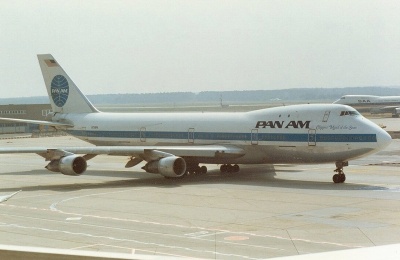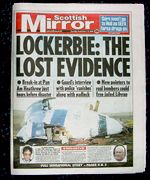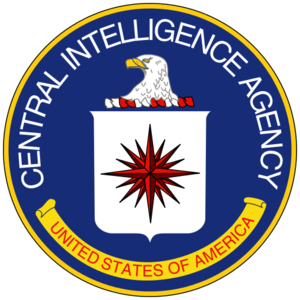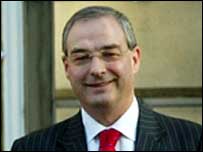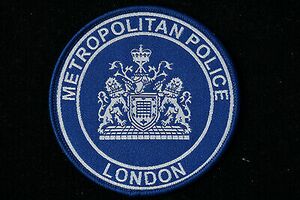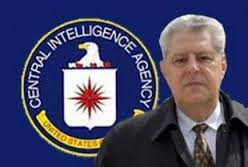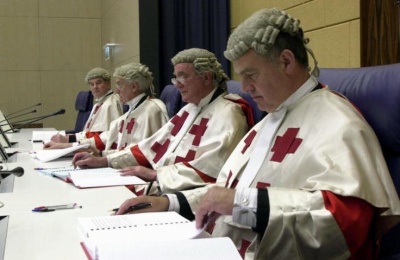Pan Am Flight 103
| A synthesis page at The How, Why and Who of Pan Am Flight 103 summarises the material in this page and other related pages.. |
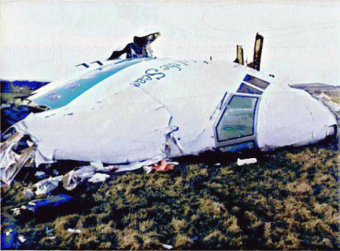 Wreckage of "Clipper Maid of the Seas" Cockpit section near Tundergarth Church | |
| Date | 21 December 1988 |
|---|---|
| Location | Lockerbie, Dumfries and Galloway, Scotland |
| Coordinates | 55°6′55.99″N 3°21′30.69″W / 55.1155528°N 3.3585250°W Fatal error: The format of the coordinate could not be determined. Parsing failed. |
| Blamed on | Abdelbaset Ali Mohmed Al Megrahi |
| Type | |
| Deaths | 270 |
| Survivors | 0 |
| Interest of | 'SlimVirgin', Safia Aoude, Juval Aviv, Robert Black, Ludwig De Braeckeleer, John Urquhart Cameron, William Chasey, Marina de Larracoechea, Adam Larson, Charles Norrie, Pierre Péan, George Thomson, Barry Walker |
| Subpage | •Pan Am Flight 103/Cover-up •Pan Am Flight 103/Fatal Accident Inquiry •Pan Am Flight 103/The Trial •Pan Am Flight 103/Unanswered questions |
| Description | When Pan Am Flight 103 exploded over Lockerbie, Scotland on 21 December 1988, killing all 259 passengers and crew on board, news reports cited UN Assistant Secretary-General, Bernt Carlsson, as its highest-profile victim. US and British intelligence operatives, posing as Lockerbie investigators, ignored the evident targeting of the UN diplomat and instead focused on the jumbo jet. With the result that the wrong country was blamed and an innocent person convicted of the Lockerbie bombing. |
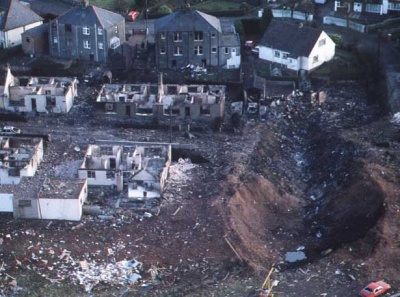
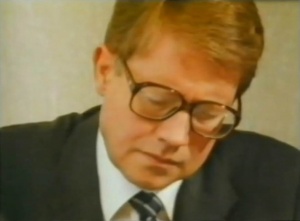
On 21 December 1988 Pan Am Flight 103, a Boeing 747-121 named "Clipper Maid of the Seas", was on a scheduled transatlantic flight from London's Heathrow Airport to New York's JFK International Airport when there was an explosion on board. The aircraft broke up over the Scottish town of Lockerbie (Map), killing all 243 passengers and 16 crew members. Eleven people in Lockerbie were killed by large sections of the plane which fell in and around the town, bringing total fatalities to 270.
Thirteen years later, on 31 January 2001, a juryless trial convicted Libyan Abdelbaset Ali Mohmed Al Megrahi of involvement in the bombing and sentenced him to life imprisonment in Scotland and acquitted his co-defendant, Lamin Khalifah Fhimah. Megrahi's appeal was refused on 14 March 2002 by a panel of five Scottish judges[1] but on 28 June 2007, the Scottish Criminal Cases Review Commission granted Megrahi leave for a second appeal on the basis of evidence that a miscarriage of justice could have occurred.[2]
After a delay of two years appeal proceedings began at Edinburgh's Court of Criminal Appeal on 28 April 2009. However, Megrahi abandoned the second appeal on 18 August 2009. Two days later the Scottish Justice Secretary Kenny MacAskill released Megrahi on compassionate grounds, as suffering from terminal prostate cancer, and he returned to Libya on 20 August 2009.[3]
Megrahi's guilt is not agreed upon[4] and Wikispooks editor, Patrick Haseldine has petitioned the UN Secretary General, Ban Ki-moon to investigate the theory that Lockerbie was a clandestine assassination of Bernt Carlsson.[5]
On 28 May 2015, Patrick Haseldine wrote to Metropolitan Police Commissioner Sir Bernard Hogan-Howe, demanding that Scotland Yard launch a Bernt Carlsson murder inquiry.[6] He wrote again on 30 June 2015 highlighting a long-forgotten Scottish Mirror newspaper report of 11 September 2001, that revealed there had been a break-in at Pan Am's baggage shed at Heathrow airport on 21 December 1988. On the strength of which Haseldine asserted that a team of Civil Co-operation Bureau operatives, led by the CCB's London-based director Eeben Barlow, broke through a security door at Terminal 3 of Heathrow airport leading to the Interline Baggage Shed from where flights would be loaded the following day. The CCB team then ingested the primary suitcase (or "bomb bag") through this security door and tagged it for loading on Pan Am Flight 103.[7] The Scottish Mirror report was effectively - some would say conveniently - buried when news of the 9/11 attacks in America swamped the commercially-controlled media later that morning.[8]
Haseldine's third letter to Sir Bernard Hogan-Howe[9] quoted from what former GCHQ officer Mike Arnold had written on 28 July 2015 on the Facebook page Who Killed Police Constable Yvonne Fletcher?:
- "We and the Americans bombed Pan Am Flight 103 to persuade South African foreign minister Pik Botha to sign the Tripartite Accord; thus with the Americans protecting our vested interests both political and financial.
- "The destruction of Pan Am Flight 103 with the Americans demonstrated our intent and was also a threat, and removing Bernt Carlsson was a convenient and powerful signal, i.e. nobody is untouchable.
- "The implication of the BBC Lockerbie report on the early morning of 9/11 implies that British Intelligence knew what was about to happen in New York, and may indeed have played a complicit role for the CIA.[10]
- "The first report appearing in the Scottish Mirror implies that they were the cut-out; similar to how British Intelligence used The Times to place a small and misleading account for what happened to me at GCHQ into the public domain.
- "As part of the bigger picture, it is probable that British Intelligence scripted the premature BBC report that WTC7 had collapsed. British Intelligence blatantly scripted The Times, Daily Mail and BBC around me."[11]
Contents
- 1 Official Narrative
- 2 Geopolitical Background
- 3 Accident Inquiries
- 4 The Investigation
- 5 The Trial
- 6 The Appeal
- 7 Media cover-up
- 8 Continuing Doubts
- 9 Alternative Possibilities
- 10 High profile victims
- 11 A Pan Am Flight 103 victim on Wikispooks
- 12 Related Documents
- 13 The Official Culprit
- 14 See also
- 15 Video
- 16 References
Official Narrative
- Full article: Lockerbie Official Narrative
- Full article: Lockerbie Official Narrative
In August 2001, Scottish Lord Advocate Colin Boyd presented what might be considered the definite statement of the Lockerbie Official Narrative at a conference of the International Society for the Reform of Criminal Law (ISRCL):[12] While admitting that "Politics and diplomacy were necessarily interwoven with this case from the start", there is no mention of Bernt Carlsson, UN Commissioner for Namibia, and the evidence led at the trial is presented as the unvarnished truth. Libyan Abdelbaset Ali Mohmed Al Megrahi, head of security for Libyan Arab Airlines, was determined at the trial to be a member of the Libyan Intelligence Services and of being guilty of the bombing. The narrative is predictably self-congratulatory: "In conclusion, it seems to me to be absolutely right that the investigation of crime and the prosecutorial decisions which flow from that investigation must be taken independently of political influence... Political and diplomatic action secured the trial. The investigation of the case and the prosecution of the trial were driven by the evidence."
Geopolitical Background
1988
- UK/US relations with Libya were icy over alleged Libyan sponsorship of "terrorism" and its stubborn refusal to 'see things the West's way'.[citation needed]
- UK/US relations with Iran were slated for improvement following the cessation of the Iran-Iraq war in which both sides had been armed by the West.
- On 3 July 1988 Iran Air Flight 655, a civilian Airbus A300 airliner en-route from Bandar Abbas, Iran to Dubai, UAE was brought down by a missile fired by the US Navy guided missile cruiser USS Vincennes, with the loss of 290 lives. The US government claimed that the airliner had been mistaken for an attacking F14 Tomcat fighter.
- Within days of the Lockerbie disaster US government spokespeople were blaming "terrorists" possibly Palestinians. Early in 1989 a CBS News report "conclusively" placed the blame on Ahmed Jibril, leader of the Popular Front for the Liberation of Palestine - General Command (PFLP-GC), asserting that Jibril's motivation was to discredit Yasser Arafat and cause the US to pull out of talks with the PLO. According to CBS, this "scoop" was provided by "reliable sources within the international terrorist community." In an age when "objectivity" is touted as the cornerstone of journalistic integrity, it is suspiciously convenient for a major network to about-face and refer to a "terrorist" as "reliable." It is unclear who constitutes the "international terrorist community."[13]
1995
- On 24 March 1995, the Los Angeles Times reported that the FBI was stepping up efforts to apprehend Abdelbaset al-Megrahi and Lamin Khalifah Fhimah, the two Libyans indicted for the bombing of Pan Am Flight 103, and devoting additional agents to the international hunt in anticipation of new leads. Signalling its impatience with sporadic reports that Libya would hand over the accused men if trade sanctions were to be removed, the FBI said it was offering a record US$4 million reward for information leading to their capture.[14]
2000
- UK-US relations with Libya were being 'normalised' following Libya's agreement to extradite al-Megrahi and Fhimah for trial and its abandonment of its allegedly belligerent stance over previously core issues of policy on trade, oil and support for groups antagonistic to Western interests. The accommodation resulted in the lifting of UN trade sanctions against Libya which had progressively paralysed its economy over the preceding decade.
- UK-US relations with Iran were close to all-time lows and deteriorating over the usual issues of Iranian refusal to 'see things the West's way'.
Accident Inquiries
- Full article: Pan Am Flight 103/Fatal Accident Inquiry
- Full article: Pan Am Flight 103/Fatal Accident Inquiry
The Air Accidents Investigation Branch submitted a detailed 54-page report on the accident to Cecil Parkinson, Secretary of State for Transport, on 6 August 1990.[15] Informed by this report, Sheriff Principal John S. Mowat carried out a Fatal Accident Inquiry in Dumfries, Scotland. His report ran to 47 pages and was in broad agreement with the official narrative.
The Investigation
Exclusion of the Met
In Chapter Three of his 2002 book "The Lockerbie Incident: A Detective's Tale" (pages 70/71), Scottish policeman John Crawford describes how officers from the Metropolitan Police were excluded from investigating the Lockerbie bombing in Scotland and quickly dispatched home to London.
I knew that a considerable amount of political in-fighting had been going on from day one. The Metropolitan Police Anti-Terrorist squad from London had tried to make the enquiry theirs from the first day. There was considerable opposition to this both politically and from the Scottish police.
Scotland Yard as any ordinary cop knows was like living on a reputation built 100 years ago. Sure it had the facilities to conduct a huge enquiry; sure it had the personnel and was supposed to have the expertise. It certainly had the resources in manpower and finance. But ask a cop in any force up and down the country who they consider the most arrogant, the most useless and the least likely to do anything for anyone beyond their 'patch' and they will undoubtedly tell you – The Met.
It's an unfortunate reputation because I personally know of a number of fine officers in that organisation who would match the best anywhere. But the reputation of the Met precedes it and it does not enjoy the high standing it thinks it does in what it disparagingly calls the 'provincial' forces. I would like to think things have changed since then but I rather think they have not.
No – neither the Scottish police nor the Lord Advocate Lord Fraser of Carmylie wanted them messing around in our enquiry. It was said the Lord Advocate presented an ultimatum to the then Prime Minister, the Iron Lady herself, Margaret Thatcher that either he was in charge of the enquiry as befitted his role as Lord Advocate in Scotland or he would resign. I cannot vouch for the veracity of that but as far as the Met Anti-Terrorist squad were concerned it was all over. They were hanging around for a few days with their flashy designer suits and the full weight of their own egos and self-importance on their shoulders, the once deserved reputation of Scotland Yard expected to sweep all before them.
After all, what could a bunch of hick 'jocks' do, we were experts only in dealing with sheep and haggis – let's face it, according to them nothing of any consequence ever happened outside London.
The Met were told in no uncertain manner that they weren't welcome! It was back to London for them.[16]
Leading the investigation
The Lockerbie investigation involved the following senior figures:
- Vincent Cannistraro - CIA task force officer in the brutal 1980s Iran-Contra campaign. Deployed a training manual of invasion and killing of Nicaraguan citizens and officials. Wrote "the anatomy of a lie" to cover up US government involvement in Nicaragua. In 1986 was commissioned by the US President to "Destabilise Libya and destroy the Gaddafi regime". Secretly worked to arm the Afghanistan Mujahideen and Osama Bin Laden. His chief Admiral Poindexter chaired a top-level meeting - to which Cannistraro had access - to discuss the manufacture of evidence to destabilise the government of Yemen. He was head of the CIA Lockerbie team, but did not attend the trial to give evidence.[17]
- Stuart Henderson - former Detective Chief Superintendent with the Lothian and Borders Police, replaced John Orr as the Senior Investigating Officer (SIO) at the Lockerbie Incident Control Centre in 1991, and led the Lockerbie bombing investigation.
- Richard Marquise - FBI's chief investigator and appointed US Task Force leader in the Pan Am Flight 103 case when the Lockerbie bombing investigation began to focus on Libya.
- Tom Thurman - discredited former head of the Explosives Unit at the FBI’s Crime Laboratory; accused of having FaBrIcated evidence to incriminate Libya.
The Trial
- Full article: Pan_Am_Flight_103/The Trial
- Full article: Pan_Am_Flight_103/The Trial
Having been indicted in November 1991 in relation to the Lockerbie bombing, the two Libyans Lamin Khalifah Fhimah and Abdelbaset al-Megrahi were charged with conspiracy to murder, murder and a breach of the Aviation Security Act 1982, Section 2. Their trial at Camp Zeist in the Netherlands began on 3 May 2000 with a bench of three Scottish Judges - Lords Coulsfield, MacLean and Sutherland (Lord Abernethy as an alternate) - sitting without a jury. Eight months later, the Crown said it intended dropping the charges of conspiracy and breach of aviation security and would be focusing on the charge of murder. On 31 January 2001, the Judges' verdict was announced: Fhimah was found not guilty, Megrahi was found guilty and sentenced to life imprisonment.[18]
The Appeal
The Defence team had 14 days in which to appeal against Megrahi's conviction, and an additional six weeks to submit the full grounds of the appeal. These were considered by a Judge sitting in private who decided to grant Megrahi leave to appeal. The only basis for an appeal under Scots law is that there has been a "miscarriage of justice," which is not defined in statute and so it is for the appeal court to determine the meaning of these words in each case.[19] Because three Judges and one alternate Judge had presided over the trial, five Judges were required to preside over the Court of Criminal Appeal:
- Lord Cullen, Lord Justice-General
- Lord Kirkwood
- Lord Osborne
- Lord Macfadyen and
- Lord Nimmo Smith
In what was described as a milestone in Scottish legal history, Lord Cullen granted the BBC permission in January 2002 to televise the appeal, and to broadcast it on the Internet in English with a simultaneous Arabic translation.
William Taylor QC, leading the Defence, said at the appeal's opening on 23 January 2002 that the three trial Judges sitting without a jury had failed to see the relevance of "significant" evidence and had accepted unreliable facts. He argued that the verdict was not one that a reasonable jury in an ordinary trial could have reached if it were given proper directions by the Judge. The grounds of the appeal rested on two areas of evidence where the Defence claimed the original court was mistaken: the evidence of Maltese shopkeeper, Tony Gauci, which the Judges accepted as sufficient to prove that the "primary suitcase" started its journey in Malta; and, disputing the Crown's case, fresh evidence would be adduced to show that the bomb's journey actually started at Heathrow. That evidence, which was not heard at the trial, showed that at some time in the two hours before 00:35 on 21 December 1988 a padlock had been forced on a secure door giving access air side in Terminal 3 of Heathrow airport, near to the area referred to at the trial as the "baggage build-up area". Taylor claimed that the PA 103 bomb could have been planted then.[20]
On 14 March 2002, it took Lord Cullen less than three minutes to deliver the decision of the High Court of Judiciary. The five Judges rejected the appeal, ruling unanimously that "none of the grounds of appeal was well-founded", adding "this brings proceedings to an end". The following day, a helicopter took Megrahi from Camp Zeist to continue his life sentence in Barlinnie Prison, Glasgow.
Media cover-up
- Full article: Lockerbie Bombing/Cover-up
- Full article: Lockerbie Bombing/Cover-up
Within a few weeks of the December 1988 newspaper reports, Bernt Carlsson's name would hardly ever be mentioned again by the commercially-controlled media in the Lockerbie context. He rapidly became something of a "nonperson" whose death was never properly investigated. Patrick Haseldine]] alleges that Tiny Rowland recruited Emeritus Professor of Scots Law Robert Black to organise the British news blackout and that "for the past 20 years, Professor Robert Black has been suppressing the truth about the Lockerbie disaster".[21]
Continuing Doubts
- Full article: Pan Am Flight 103/Continuing Doubts
- Full article: Pan Am Flight 103/Continuing Doubts
As of 2015, doubts about the justice of Megrahi's conviction are more widespread than ever.
Cameron's Report on Forensic Evidence
- Full article: Cameron's Report on Lockerbie Forensic Evidence
- Full article: Cameron's Report on Lockerbie Forensic Evidence
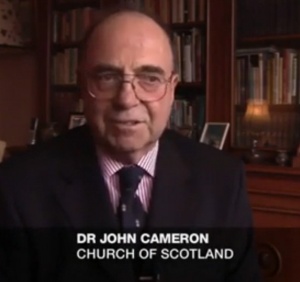
At the beginning of 2003, former South African president Nelson Mandela asked the Western Christian churches to intervene in what he termed "a clear miscarriage of justice", referring to the conviction of Megrahi at Camp Zeist. In July that year, the Moderator of the General Assembly of the Church of Scotland, Rt Rev Professor Iain Torrance, took up the challenge and appointed the Church of Scotland's leading scientist Dr John Urquhart Cameron to conduct a scientific examination of all the forensic evidence which had convicted Megrahi. As a result, Cameron produced a damning report on the conduct of the forensic experts and on the evidence presented to the trial.[22]
Scottish Criminal Cases Review Commission
On 23 September 2003 lawyers acting for Megrahi applied to the Scottish Criminal Cases Review Commission (SCCRC) for a review of the case (both sentence and conviction), arguing that there had been a miscarriage of justice. On 1 November 2006, Megrahi was reported to have dropped his demand for the new appeal to be held at Camp Zeist.[23] After a four-year review the SCCRC concluded that there was evidence that a miscarriage of justice might have occurred, so Megrahi was granted leave to appeal against his conviction for a second time.[24]
- Full article: Abdelbaset al-Megrahi/Compassionate release
- Full article: Abdelbaset al-Megrahi/Compassionate release
On 20 August 2009, Megrahi was granted compassionate release, after having agreed to abandon his appeal.
Questions remain unanswered
How did one suitcase, which contained Semtex occupy a precise bottom-row location close to the edge of the aircraft’s hull? Seven containers were filled with luggage that came from Heathrow Terminal 3. An eighth container, marked AVE4041, was for baggage from a transfer flight from Frankfurt. No screening of the eighth container took place. One of the loading area staff in Heathrow initially told police he had noticed a single hard-shell suitcase already loaded at the bottom of AVE4041. This scenario was expected to be re-examined had a Scottish appeal court been allowed to test the conviction of Abdelbaset al-Megrahi. If the bomb in the suitcase was loaded at Heathrow, then Megrahi and the official account of the Libyan’s movements in Malta all begin to look unconnected. The Heathrow flight was also delayed, suggesting that if the bomb was loaded in Malta and on a timer, it should have exploded before it took off in London.
Does it matter that such detail remains the subject of debate? It does. Because if you accept a porous account and decide that a weak explanation is better than no explanation, then whatever lessons you claim to have learned will be worthless. If the conviction of Megrahi was merely a convenient round-up of the Libyan bad guys, then the Scottish justice system (and, by implication, its British counterpart) are damaged by pragmatic injustice.
The failures of Lockerbie should serve as warning to the Metrojet Flight 9268 investigation that will come in Egypt. The objective should be the truth. Anything less and all we will do is wait for the next “game-changer”.[25]
Alternative Possibilities
South African Apartheid Regime
President P W Botha ruled apartheid South Africa between 1978 and 1989 and was responsible for gross human rights violations, including all the violence that was sanctioned by the State Security Council (SSC), an executive organ of his apartheid regime. Such violence included using torture, abduction, arson and sabotage, and murdering those opposed to apartheid.[26] An SSC subcommittee, chaired by 'superspy' Major Craig Williamson, targeted anti-apartheid groups and individuals.[27]
From Chequers to Lockerbie
The distance by road from Chequers, the Prime Minister’s country residence in Buckinghamshire, to the site in Scotland of the Pan Am Flight 103 crash on 21 December 1988 is 310 miles. It took more than 4½ years for President P W Botha to complete his murderous journey from meeting Margaret Thatcher at Chequers on 2 June 1984 to the sabotage at Lockerbie.[28]
The full article "From Chequers to Lockerbie" by Patrick Haseldine can be read here.
Ayatollah's Vengeance Exacted by Botha's Regime
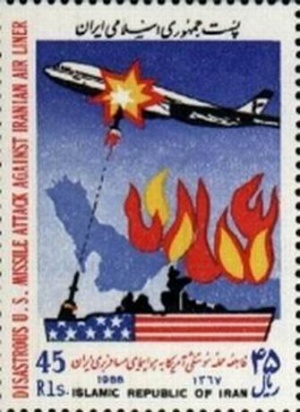
The following is a transcript of Patrick Haseldine's Facebook article published in March 2011:
- On 3 July 1988, the US Navy deliberately shot down Iran Air Flight 655 in the Persian Gulf killing all 290 civilian passengers and crew on the Airbus A300. Iran's Ayatollah Khomeini vowed that the skies would 'rain blood' in revenge. Months passed and no attempt at Iranian retaliation was made, even though there were hundreds of US passenger aircraft worldwide to target each day. A truce had been arranged for the duration of the US presidential election campaign, which ended on 8 November 1988 when Vice President George Bush was elected to succeed the incumbent Ronald Reagan. Thus, nearly six months would elapse before Iran's revenge attack finally happened.
- The eventual target was a Pan American Airways Boeing 747 jumbo jet that was scheduled to depart London's Heathrow Airport on 21 December 1988. Early that morning, South African Airways Flight 234 from Johannesburg carrying an official delegation which included two government ministers landed at Heathrow. The 23-strong party was led by South African Foreign Minister Pik Botha – not to be confused with South Africa’s autocratic President P W Botha – and Defence Minister General Magnus Malan. For over a decade, apartheid South Africa had been defying UN Security Council Resolution 435 by continuing to occupy neighbouring Namibia (which President Botha insisted on calling South-West Africa) and by exploiting its valuable mineral resources in violation of UN law. On 22 December 1988 at UN headquarters in New York Pik Botha would sign an historic agreement bringing an end to the apartheid regime’s occupation of Namibia and handing over control to the United Nations. Seats had been reserved for the South African party on Pan Am Flight 101 which, following a special security check of the aircraft, took off from Heathrow at 11:00hrs GMT. Flight Pan Am 101 landed safely at JFK, New York at 13:45hrs EST.
- In the evening of 21 December 1988, without any security check, Pan Am Flight 103 destined for New York took off from Heathrow at 18:25hrs GMT. Thirty-eight minutes after take-off, Pan Am Flight 103 exploded over Lockerbie in Scotland killing all 259 people on board the aircraft, and eleven in the town of Lockerbie. Iran’s revenge attack thus resulted in 270 fatalities, of whom Assistant Secretary-General of the United Nations, Bernt Carlsson, was the most prominent. It would have been Bernt Carlsson’s responsibility as UN Commissioner for Namibia to take charge of the country as soon as South Africa agreed to cede control on 22 December 1988. Carlsson had already issued a clear warning to the companies and countries that were flouting the UN prohibition on exploiting Namibia’s minerals (especially uranium and diamonds) that he intended to take legal action against them. Iran was one of the countries facing prosecution because, as well as owning 15% of the Rössing Uranium Mine, it was receiving shipments of Namibian uranium to develop its nuclear programme. In targeting Pan Am Flight 103 therefore Iran not only avenged Iran Air Flight 655 but also took out the one individual at the United Nations with the power to prosecute the companies eg Rio Tinto Group (joint owner of the Rössing Uranium Mine) and De Beers (owner of CDM diamond mines) and the countries eg Iran and South Africa that were in breach of UN law.[29]
Q & A Session
Q. Why didn't Pik Botha's party fly South African Airways direct to New York?
A. Because the 1986 US Comprehensive Anti-Apartheid Act banned SAA flights from landing in America.
Q. How did the Iranians know that UN Commissioner for Namibia, Bernt Carlsson, would travel on Pan Am Flight 103 of 21 December 1988?
A. They relied on their apartheid South African friends to ensure Carlsson joined that particular flight. He was induced to rearrange his Brussels/New York itinerary, and took a flight from Brussels to Heathrow (arriving by flight BA391 at 11:06hrs on 21 December 1988) for a meeting in London with De Beers, the South African diamond mining and marketing conglomerate. After the meeting, De Beers chauffeured Carlsson back to Heathrow in good time to catch Pan Am Flight 103.
Q. Was it the Iranians or the South Africans that put the bomb in Bernt Carlsson’s checked-in suitcase while it was unsupervised at Heathrow?
A. Masterminded by the apartheid regime's superspy Major Craig Williamson, Iran's revenge attack was carried out by the Europe Branch (based in London) of South Africa’s Civil Cooperation Bureau (CCB), whose operatives substituted the ‘bomb bag’ for Bernt Carlsson’s suitcase at Heathrow Airport. No trace of his suitcase was ever found.
Q. Who supplied the bomb?
A. Marwan Khreesat, a Jordanian double agent who infiltrated the Popular Front for the Liberation of Palestine - General Command (PFLP-GC), told FBI special agent Edward Marshman and forensic investigator Thomas Thurman in 1989 that he had built five barometrically triggered aircraft bombs when he was in Neuss, West Germany in October 1988. German BKA police intercepted four of these devices in November 1988 following the arrest of a PFLP-GC terrorist cell in Neuss. Khreesat said that the fifth bomb had been taken by a senior PFLP-GC agent named Abu Elias, who escaped arrest in Germany. Abu Elias is suspected of supplying the South African CCB with the bomb that brought down Pan Am Flight 103.
Q. How was the bomb transported from Germany to Heathrow?
A. According to Paul Foot's article "Lockerbie: The Flight from Justice": "In August 1997, the German magazine Der Spiegel published a long article about Lockerbie that was completely ignored in the British Press. It cited 'a new witness who has been making detailed statements to the German police and prosecutors.' The man was named as Abolghasem Mesbahi and was described as 'a credible witness.' What he was saying contradicted 'the Anglo-American thesis of the sole involvement of Libya.' Mesbahi’s story was as follows: 'The bomb had been loaded in single pieces at Frankfurt airport into an aeroplane to London. The head of IranAir at Frankfurt at that time, a secret serviceman, had smuggled them past the airport controls. They had then been assembled in London and put on the Pan Am clipper.'
"Despite Der Spiegel’s evidence for the credibility of Mesbahi, and his numerous high-level contacts in Iranian intelligence, this story was quickly and effectively buried."[30]
Q. Was the break-in at Heathrow Airport’s Terminal 3 on 20 December 1988 anything to do with the bombing of Pan Am Flight 103?
A. Possibly. Security guard Ray Manly, who discovered that the padlock had been cut on security door CP2 leading to the Pan Am baggage area, told the Lockerbie appeal court at Camp Zeist in 2002: "I believe it would be possible for an unauthorised person to obtain tags for a particular Pan Am flight and then, having broken the CP2 lock, to have introduced a tagged bag into the baggage build up area." Manly immediately reported the break-in to the police but was not interviewed by the Metropolitan Police until 31 January 1989. No mention of the Heathrow break-in was made at the 2000-2001 Lockerbie trial of the two Libyans Megrahi and Fhimah. (The break-in became public knowledge on 11 September 2001 when the Scottish Mirror's front page headline screamed "Lockerbie: The Lost Evidence".)
Q. Why wasn’t the bomb timed to go off when the aircraft was over the Atlantic Ocean?
A. The bomb had a barometric detonator and automatically exploded 30 minutes after the aircraft reached a set altitude. Because the aircraft came down on land rather than into the ocean it was demonstrably not an accident (important when revenge is the motive for the bombing).
On 3 March 2011, Oliver Tickell asked three questions:
- Q1. Why did South Africa want to carry out this attack on behalf of Iran?
- Q2. What part did Iran play in the attack?
- Q3. How was this narrative, if true, suppressed?
Patrick Haseldine replied:
- A1. To prevent prosecution by UN Commissioner for Namibia, Bernt Carlsson, for breaching UNCN Decree No 1, the apartheid regime and Iran both wanted Carlsson dead.
- A2. Iran helped in targeting Bernt Carlsson on Pan Am Flight 103.
- A3. It is not for me to speculate how it was suppressed. All I can say is that nothing of mine has been published since 22 December 1993.[31]
High profile victims
The highest profile victim aboard Pan Am Flight 103 was UN Commissioner for Namibia, Bernt Carlsson, on his way to attend a ceremony at United Nations headquarters in New York the next day when South Africa agreed to grant independence to Namibia. However, after a brief spell of attention, this angle of the bombing was not pursued by the commercially-controlled media.
US Intelligence
Four US intelligence agency employees were also aboard, having flown together from Cyprus on flight CY504 which arrived at Heathrow at 14:34:
- Matthew Gannon, the CIA deputy station chief in Beirut, Lebanon[32]
- Major Chuck McKee, US Army Major on secondment to the DIA in Beirut
Two Diplomatic Security Service special agents were acting as bodyguards to Gannon and McKee:
- Ronald LaRiviere, a security officer from the US Embassy in Beirut
- Daniel O'Connor, a security officer from the US Embassy in Nicosia, Cyprus
US Military
Sixteen US military personnel died on Pan Am Flight 103:
- Philip Bergstrom, Army Sergeant
- Willis Coursey, US military
- Joseph Curry, Army Captain
- Edgar Eggleston, Air Force Sergeant
- Kenneth Gibson, Army Specialist
- Lloyd Ludlow, Army Sergeant
- Douglas Malicote, Army Specialist
- Jewel Mitchell, Army 2nd Lieutenant
- Mary Smith, Army Sergeant
- Michael Stinnett, Army Specialist
- Lawanda Thomas, Air Force Sergeant
- Bonnie Williams, US military
- Eric Williams, Army Sergeant
- George Williams, Army 1st Lieutenant
- Dedara Woods, Air Force Sergeant
- Joe Woods, Civilian Military worker[33]
A Pan Am Flight 103 victim on Wikispooks
| Title | Description |
|---|---|
| Matthew Gannon | CIA officer killed in the Lockerbie Bombing |
Related Documents
| Title | Type | Publication date | Author(s) | Description |
|---|---|---|---|---|
| Document:Call for US to give update on fourth Lockerbie suspect | Article | 18 December 2022 | Kathleen Nutt | Former Justice Secretary Kenny MacAskill: "Britain and America know everything. I want the UK and US to be more open. Libya have offered up Abu Agila Masud. But Masud is smaller beer. The Lord Advocate should find out what progress is being made on bringing Abdullah Senussi to court." |
| Document:Did German bungling lead to Pan Am 103? | Article | 24 September 1989 | Gavin Hewitt | The blunders of "Operation Autumn Leaves" didn't end with the case of Marwan Khreesat. One of those arrested in the 26 October 1988 sweep was a Palestinian by the name of "Ramzi Diab" which was not his real name, it turned out. That name had been taken from an Israeli passport stolen in Spain. The German police suspect he may actually have transported the Lockerbie bomb. |
| Document:Fragments of Truth | Article | 1 December 2009 | Mark Hirst | |
| Document:Libya: Fine, but why Britain | article | 20 March 2011 | Brian Barder | David Cameron seemingly Gung Ho on toppling the Libyan leader, Muammar Gaddafi, while Barack Obama takes a back seat |
| Document:Lockerbie - Bomber, Bomber, Bomber | article | 21 July 2010 | Steven Raeburn | |
| Document:Lockerbie - The Syrian Connection | article | 1997 | David Guyatt | |
| Document:Lockerbie Bombing and my Reinstatement in HM Diplomatic Service | letter | 29 January 1997 | Patrick Haseldine | Former diplomat Patrick Haseldine writes to former Prime Minister James Callaghan |
| Document:Lockerbie Lies | Article | 22 December 2017 | Steven Walker | The Lockerbie bombing remains a text book case of a terrible tragedy causing considerable pain and suffering to relatives whose search for answers and clarification about why and how their loved ones died have taken second place to geo-political manoeuvres, deliberate meddling in legal processes, and the murky world of secret service wheeling and dealing on behalf of governments with no respect for human decency. |
| Document:Pan Am Flight 103: It was the Uranium | article | 6 January 2014 | Patrick Haseldine | Following Bernt Carlsson's untimely death in the Lockerbie bombing, the UN Council for Namibia inexplicably dropped the case against Britain's URENCO for illegally importing yellowcake from the Rössing Uranium Mine in Namibia. |
| Document:PanAm-Rätsel LOCKERBIE: Es war Südafrika!…so wie bei Olof Palme | Article | 6 October 1996 | Kurt Seinitz | "It would have been easy for South African secret service agents, who had infiltrated Sweden's anti-apartheid movement, to exchange Carlsson's tape recorder in a hotel room against one containing the bomb. And then placing it inside one of those 'ubiquitous' Samsonite suitcases, so beloved by the peripatetic Bernt Carlsson." |
| Document:Reinstatement in HM Diplomatic Service | Letter | 6 January 1997 | Patrick Haseldine | A plea for reinstatement in the Foreign and Commonwealth Office by "Thatcher's Whitehall Critic" |
| Document:Release of the Lockerbie Prisoner | report | 21 August 2009 | Hans Köchler | A report by the official UN Observer of the Lockerbie Trial in the Netherlands, commenting on the release on compassionate grounds of the only person convicted in the Lockerbie case. |
| Document:South Africa Minister Denies Knowing Of Lockerbie Bomb | Abstract | 12 November 1994 | David Tucker | Having confirmed that South African foreign minister Pik Botha and his 22-strong party had been booked on Pan Am Flight 103 but switched flights after arriving early in London from Johannesburg, spokesman Roland Darroll said: "The minister is flattered by the allegation of near-omniscience." |
| Document:Targeting of Bernt Carlsson on Pan Am Flight 103 | Letter | 17 February 2023 | Patrick Haseldine | Ian Ferguson: "In the early stages of the Lockerbie investigation, Bernt Carlsson's Presikhaaf suitcase was seen as the more likely bomb case. Police sources at the time said that this case was cleared of being the suspect case on November 23rd 1989." |
| Document:The Crime of Lockerbie | Article | 16 August 2009 | Tam Dalyell | Tam Dalyell said: "Yes, I have read 'The Downing Street Years' very carefully. Why in 800 pages did you not mention Lockerbie once?" Mrs Thatcher replied: "Because I didn’t know what happened and I don’t write about things that I don’t know about." |
| Document:The Rossing File:The Inside Story of Britain's Secret Contract for Namibian Uranium | pamphlet | 1980 | Alun Roberts | Scandal in the 1970s and 1980s of collusion by successive British governments with the mining conglomerate Rio Tinto to import yellowcake from the Rössing Uranium Mine in Namibia (illegally occupied by apartheid South Africa) in defiance of international law, and leading to the targeting of UN Commissioner for Namibia Bernt Carlsson on Pan Am Flight 103 in December 1988. |
| Document:Unanswered questions over Lockerbie | Article | January 1995 | Phil Johnson | According to Tam Dalyell MP: "The American and British governments do not want the film shown. The American families do not want the film shown because they want their compensation money ($2.7 billion). More importantly, their lawyers want their money ($810 million)." |
| File:A Tale of Three Atrocities.pdf | report | August 2009 | Charles Norrie | The report suggests that three ostensibly unconnected flight sabotages may in fact be connected. The main focus is the Pan American Airlines Flight 103, downed over Lockerbie in December 1988. It suggested that the CIA facilitated the Lockerbie atrocity by Iranian operatives as a quid-pro-quo for the downing of the Iranian airliner some 5 months earlier. |
| Document:"Setting Up" Libya For The Lockerbie Bombing - Part 2 | webpage | 15 September 2004 | Joe Vialls | |
| Document:The Canadian Connection To Lockerbie & Pan Am 103 | webpage | 14 February 1998 | Joe Vialls | |
| Document:The Bomb Trigger on Pam Am 103 | webpage | May 2002 | Joe Vialls | |
| Document:Setting Up" Libya For The Lockerbie Bombing - Part 1 | webpage | 15 September 2004 | Joe Vialls |
The Official Culprit
| Name |
|---|
| Abdelbaset al-Megrahi |
See also
- Highly Recommended - The Herald, Scotland - Lockerbie archive - A substantial Establishment-sceptic resource.
- Highly Recommended - - ohmynews - list of articles on the Lockerbie Bombing
- The Fall of Pan Am 103: Inside the Lockerbie Investigation 1990, by Steve Emerson and Brian Duffy, Putnam, ISBN 0-399-13521-9
- Scottish Law Reporter. Lockerbie pages
- Lockerbie - The evidence
- Flight From the Truth - The Guardian 27 June 2001
- Jim Swire's Web Site
- Facebook group: U.N. must investigate the targeting of Bernt Carlsson on Pan Am Flight 103
- 'Lockerbie Conspiracy' by Thatcher and Reagan
- Lockerbie: Apartheid General Targeted UN Commissioner
- Pan Am Flight 103: Why has it taken so Long for the finger of suspicion to point towards South Africa?
- Lockerbie Bombing: The 'Finnish' Question
- Bernt Carlsson in Secret Meeting with 'Pressuriser' from the Diamond Cartel
- Major Craig Williamson: the 'real' Lockerbie bomber
- Gordon Brown says Lockerbie victim Bernt Carlsson was the target
- Lost on Flight 103: A Hero to the Wretched of the World
- Bernt Carlsson: A Very Private Public Servant
- Dr Jim Swire petitioned PM to compensate Lockerbie campaigner Patrick Haseldine
- Comments from Patrick Haseldine on Robert Black's Blog - 6 October 2009
- Crown Fights to keep 48 pieces of evidence secret - Glasgow Herald 19 February 2010
- Questions remain over Lockerbie - Guardian letters 23 July 2010
- Lockerbie witness 'put up for reward'
- Lockerbie Bombing Case Faces U-Turn after Perjury Confession - Sofia News Agency 20 August 2007
- UN Claims Lockerbie Trial Was Rigged - Common Dreams 8 April 2001 from The Glasgow Herald
Video
- Lockerbie Lies - A Youtube video featuring Professor Robert Black who was largely responsible for the setup of the Camp Zeist trial and believes that Megrahi would be acquitted in any retrial.
- "The Lockerbie Bombing - Pan Am Flight 103" Al-Jazeera TV documentary featuring Professor Robert Black and Dr John Cameron.
References
- ↑ "UN monitor decries Lockerbie judgement"
- ↑ File:SCCRC-Lockerbie.pdf - SCCRC Leave to appeal decision press release - June 2007
- ↑ "Lockerbie bomber's appeal dropped"
- ↑ "Flight 103: it was the Uranium"
- ↑ "Take action to investigate the deaths of UN Officials Dag Hammarskjöld and Bernt Carlsson!"
- ↑ "Scotland Yard to launch Bernt Carlsson murder inquiry"
- ↑ "Pan Am 103: South Africa Guilty"
- ↑ "Lockerbie: Heathrow break-in revealed"
- ↑ "Sir Bernard gets the message!"
- ↑ "Suppressed Lockerbie evidence ignited 9/11 attacks"
- ↑ "Comment by former GCHQ officer Mike Arnold on the Facebook page 'Who Killed Police Constable Yvonne Fletcher?'"
- ↑ "The Lockerbie Trial" by Rt Hon Colin Boyd QC, Lord Advocate, Scotland
- ↑ "Up in the air?" The Michigan Daily, 14 February 1989
- ↑ "FBI Offers Record $4-Million Reward in Lockerbie Bombing"
- ↑ "AAIB report on the accident to Boeing 747-121, N739PA at Lockerbie, Dumfriesshire, Scotland on 21 December 1988"
- ↑ "The Lockerbie Incident: A Detective's Tale"
- ↑ "Lockerbie frame-up"
- ↑ "Full wording of initial charges"
- ↑ "14 days to launch appeal"
- ↑ "Grounds of appeal"
- ↑ "Blackout over Lockerbie"
- ↑ "Lockerbie: Mandela and Dr John Cameron's Report"
- ↑ "Appeal can be held in Edinburgh"
- ↑ "SCCRC referral of Megrahi case"
- ↑ "We failed to learn from Lockerbie, and repeat our mistakes at peril"
- ↑ "South African Truth and Reconciliation Commission"
- ↑ "Interview with SA 'superspy' Craig Williamson"
- ↑ "Botha 'linked to murder decisions'"
- ↑ "Lockerbie: Ayatollah's Vengeance Exacted by Botha's Regime"
- ↑ "Lockerbie: The Flight from Justice"
- ↑ "Flight path"
- ↑ "EverythingPanAm.com The Virtual Pan Am Museum"
- ↑ "Victims of Pan Am Flight 103"
